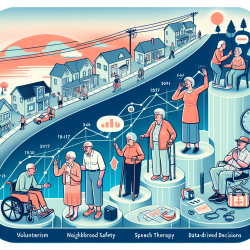Introduction
In the realm of speech-language pathology, understanding the intricate relationship between prosodic processing and traumatic brain injury (TBI) is crucial for enhancing therapeutic outcomes. The systematic review titled "Prosodic Processing Post Traumatic Brain Injury - A Systematic Review" offers valuable insights into how prosodic impairments can affect individuals with TBI, particularly children. This blog aims to distill these findings and provide actionable strategies for practitioners to improve their therapeutic interventions.
Understanding Prosodic Processing and TBI
Prosodic processing refers to the ability to interpret the rhythm, stress, and intonation of speech. It plays a pivotal role in conveying emotions and intentions, which are essential for effective communication. The review highlights that individuals with TBI often struggle with prosodic processing, leading to difficulties in emotion recognition and social interactions.
Key Findings from the Review
- Impaired Prosodic Processing: All eight studies reviewed found that individuals with TBI exhibited significant impairments in prosodic processing compared to controls.
- Emotion Recognition Challenges: TBI patients had slower reaction times and difficulties in identifying emotions from prosody, especially when prosodic cues conflicted with semantic content.
- Impact on Social and Employment Outcomes: Prosodic impairments were associated with psychiatric issues, social integration challenges, and employment difficulties post-TBI.
Implications for Practitioners
For speech-language pathologists, these findings underscore the importance of incorporating prosodic processing assessments and interventions into therapy plans for TBI patients. Here are some strategies to consider:
- Early Assessment: Implement comprehensive prosodic processing evaluations early in the rehabilitation process to identify specific impairments.
- Targeted Interventions: Develop targeted interventions that focus on improving prosodic skills, such as emotion recognition exercises and prosody-based communication tasks.
- Multidisciplinary Approach: Collaborate with psychologists and occupational therapists to address the broader social and emotional challenges associated with prosodic impairments.
Encouraging Further Research
While the review provides a solid foundation, further research is needed to explore the neuropsychological markers of prosodic processing in TBI recovery. Practitioners are encouraged to contribute to this growing body of knowledge by conducting longitudinal studies and sharing findings within the scientific community.
Conclusion
By understanding and addressing prosodic processing impairments, speech-language pathologists can significantly enhance the quality of life for individuals with TBI. These efforts not only improve communication skills but also foster better social integration and emotional well-being.
To read the original research paper, please follow this link: Prosodic processing post traumatic brain injury - a systematic review.










